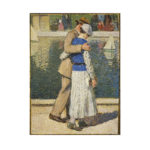In love, we seek closeness. We seek to close the distance between the you and the I, to hold the otherness and become the us. We want to be an us.
Love enjoys everything. Love needs everything. Love is a knowing and of being known not of flesh but through the flesh.
Intimacy itself means “into-me-see” and it requires a certain narrowing of the distances between us: it requires vulnerability, openness, receptivity, allowing someone into our world, and perhaps more than anything, it demands authenticity. It is where the soul of the relationship is born and nurtured – where the boundaries between us dissolve and we become us.
When most people hear the word intimacy they usually think of emotional and sexual. But there are so many ways in which we can create, increase and nurture intimacy in relationships. There are usually twelve kinds of intimacy including physical, emotional, intellectual, aesthetic, creative, recreational, work, crisis, commitment, conflict, communication and spiritual.
Emotional intimacy is of course the most important ones because without it not much else can be build upon to thrive – for both partners to feel seen, heard, understood and loved. Emotional intimacy is what love truly is – it is our ability to share our feelings and emotions, and express our love freely and unconditionally.
Intellectual intimacy is the ability to discuss different topics and be open to one another’s perspectives, especially when it challenges our own. We grow and expand, and having a partner to share our ideas and thoughts with is greatly fulfilling. Of course, this is where communication intimacy ties in – because without good communication not much is possible. Most people would communication is the key – and yet it is actually understanding that is the key. This requires empathy and listening.
Physical intimacy is not just about sex – it can sometimes be as simple as touching and holding one another’s hand – a simple gesture which wordlessly conveys, “I see you. I’m here for you. We’re in this together.” Sexual desire is also a part of it of course, and it thrives on desire and our erotic selves, a state of vitality and imagination within us.
And there are so many ways in which we make love – lips, hands, eyes, words, gestures, scent, touch, taste, breasts, nipples, neck, movement, textures, and on and on … Using only our genitals is a rather boring way to approach love making.
The difference between sex and eroticism is in the imagination. Exploring ourselves through our senses is a great way to learn to expand our imagination and experience ourselves and our partners differently, and be more fulfilled.
And then there is conflict and crisis which make the list in the above intimacies. This doesn’t refer to abuse in any shape or form – but rather it refers to our ability to solve tensions into peace. It is often times during our times of distress and misunderstandings that we can actually bond deeper – or separate. Can we exercise empathy during an argument? Can we remain focused on the issue, and that we aren’t fighting against each other, but fighting together for a solution – for a way to both feel better? The way we navigate through tensions shows us a lot about our partner and whether that’s someone we can fully trust in our weakest, not brightest, moments. If they can still hold us gently, even when they have us by the wrist so to speak, we can fall into their arms and create more depth. Having someone who doesn’t hold onto grudges, knows when to stop a purposeless fight, and has our best interest in all times – is the right one.
Desire.
Desire is the wild beautiful creature that lives beneath our skin. It is our heat. And as the years pile up, we sometimes lose this wildness towards our partner – because while love is about closeness, desire is about mystery.
Desire needs mystery. We need the distance, where we can stand on one side of a bridge and be taken from where we are into a place we’ve never been.
While the closeness of love and the mystery of desire may seem like opposing forces, like great big paradoxes, they can certainly be reconciled into oneness.
Sometimes, we just need to take step back and see our partner from across the room. We need to allow ourselves to see them in their natural creative flow and their self-sufficiency. Whether it is them working on their car, their garden, their craft, their writing, or laughing at a movie, or solving a problem, or dancing in their freedom – we invite ourselves to find the mysterious stranger in the one we’ve been loving and sleeping next to all along. This sudden spark will invite us to re-learn them and re-explore them.
We need to appreciate their otherness, their wild unknown, despite the thinking that we already know them all so deeply. And the truth is: There will always be parts of our partner that will remain wild and unknown, no matter how long we lived together. Along the circlings of the staircases throughout our life, we change. And there is always something new to discover about the inner world of another person. Like art. There is always a new shade, a new nuance, a new movement of the brush we may discover in an old painting, depending on how we see it, and on how light touches it.
We can find our way back to each other. Along the circling staircases of our house, we can pause, and see each other again. And in simple gestures, in simple moments, with a lot of heart and intention, we can find a new way of loving. We can find that making love comes in so many ways, not just with genitals – and re-explore one another in beautiful, meaningful ways allowing for a deepening. There, an almost new soul will be born out of our love and desire together.
Eroticism increases the emotional connection.
Like we already discussed, eroticism isn’t about just sex. The ancient mystics described it as an experience of aliveness, vitality; it is a transgressive force that negates the boundaries of the “known” and enters us into a state of full bodied creativity. Through the freedom of this borderless creativity and aliveness, we can allow ourselves to be stirred entirely by the wildish soul of another. Emotions need that. Emotional connection needs that. Because emotions are water, they need their freedom, they need their flow, they need to move inside and through us as they need. Flatness affects the emotional connection. The way we truly connect to another emotionally is often times, through a risk. Not recklessness – but a leap of faith.
If you want to feel transported into another world, into another experience, you need to take risks. I’m not talking about danger – but about the vulnerability of exposure and exploration that would ultimately build and nurture the trust of which love will become.
Deep eroticism is intimate.
Deep intimacy is erotic.
Love itself is a risk – the risk to unveil ourselves, in vulnerability, to allow another in our world, to be changed by love, to have love peel our layers, and to perhaps suffer if it doesn’t turn out the way we wanted it to.
Any time to dive deeper into something that takes the ground from beneath your feet – such as love, vulnerability and trying something new sexually – it feels scary.
Will I get hurt? Do I want to get hurt? Am I willing to get hurt? What if it’s great? What if I fail? What if he doesn’t like me to touch him this way? What if I’m rejected? What if I lose myself?
Taking a risk to fall in love, and be in love, and be with another, doesn’t mean we’ll never be hurt. But it’s a promise that when we do get hurt, we’ll have the confidence and ability to find each other again – to hold each other, raise each other, support each other, and lift one another up.
Risk opens us to the possibility of being disappointed and hurt – but that’s something that will happen anyway. However, if we do take this chance, this leap of faith, it also opens us to the possibility of building trust in each other, a deeper emotional connection and for finding our way back as things get better between us. And of course, if things don’t work out, we’ll just know and fully understand that we can’t trust them. And then we need the discernment of heart what to do next.
Lovers meet when one has the courage to unveil their heart and soul, and the other has the humility to unveil theirs also.
Desire begins in our mind. And contrary to popular beliefs, it is actually women, and not men, who get bored faster in monogamous relationships. This is because for women, desire isn’t just sudden – it needs mystery more than anything else. For a woman, the art of seduction is a turn on. In fact for a woman, arousal begins not five minutes before sex – but it begins at the end of her last orgasm. So all the moments and days or months or years in between – is what will ultimately lead her. It’s the gestures, the words, the slow dance, the animal pacing of closeness and distance, her partner’s behaviour … For a woman – she becomes more aroused the more stable her environment is; the more emotionally stable and safe she is made to feel by her partner, the more she unveils in her sexuality as well.
And again – desire begins in the mind. In imagination, creativity and curiosity, eroticism lives. We invoke the beginner’s mind when we can approach the same things with different eyes, different movements, different speeds. Through erotic thinking, through creativity, through the desire to emotional connect to one another more deeply – we are invited into the unknown. There, anything can happen. There are many twists and turns along the unique physical, emotional and spiritual wildlands. But powered by our curiosity, intuition, imagination and intention, we dive fully.
We re-imagine the kitchen as a scene in Venice.
We re-explore the twists and curves of one another.
We follow the scent as we are heart-led, desire-led, hands-led.
In order words, we introduce a newness, and a willingness to be vulnerable, so that we experience one another, and ourselves, in new ways.
Intimacy through the senses.
“Eroticism reveals to us another world, inside this world. The senses become servants to our imagination, letting us see the invisible and hear the inaudible.” ~ Octavio Paz
The aliveness and expansion we feel through eroticism goes beyond the sexual realm. When we embody our erotic self, we enter new worlds, without and outside of us. We arouse the heat that lives inside our underground. And this creates so much love.
We listen a little closer. We touch a little softer. We see more clearly and we notice more deeply. We savour and linger in each taste. We smell everything like wild creatures in the forest. We sense our partner in the subtle ways. We are fully in tune and aligned to feeling and sense – all of which allows us to bond deeper, to understand deeper. We nurture connection. We imbue everything with more meaning and soul. When we pay more attention to our partner, love grows, desire grows.
When times are tough, it is the life force of eroticism that can become our anti-dote to death and flatness. Actually, and perhaps especially, when couples are facing challenges, they need to re-explore one another through the erotic powers of imagination, curiosity and creativity.
Touch increases intimacy.
Touch is the first sense that we develop. As babies, touch is how we learn of the world outside the womb. Touch makes us feel good or bad, safe or unsafe, pleasure or pain. Touch is how we self-soothe as it releases oxytocins, and how we connect and re-connect. We do this when we play with our hair, when we hold ourselves at night, when we get a massage, or when we take a shower or bath so that the water touches us.
We explore textures, temperatures, pressures, speeds and movements through our touch. We learn what we love and what we don’t. We learn to touch ourselves and be in pleasure, so that we can then guide our partner to do the same.
Sometimes, we have just forgotten how to touch. And even a gentle, accidental, touch on our hand can awaken us into something new again.
Sometimes, we just need to let go of our monkey brain from the day’s worries and routines, put body in bed, skin against skin, and allow our body into its awakening – into the remembering “I like this person.”
Touch is important and very needed. Often times the way back to one another is just to remember to touch our partner’s hand, to remember their skin, to allow our fingers to remember also. Often times a simple touch on the shoulder or a hug is all that’s needed to wordlessly express, “I see you. I hear you. I understand you. I care about you. I’m here. I love you. I’m excited to be here with you still. We’re in this together, still.”
It’s amazing how much you can communicate with touch and patience.
An exercise.
Touch your partner’s hand. Run your fingers across his arm, on their back too, experimenting with different speeds, movements and pressures. You can also experiment with different fabrics and temperatures if you want also. The one thing to remember: Keep your entire focus on your partner – his body language and looking into his eyes. “Does he like this? Which does he prefer?” This is a non-goal oriented pleasure exercise, meaning that the goal isn’t towards arousal – but rather, it is to bring the full attention on what we like and how we like it.
Now turn the focus on you. Take his hand and use it to please yourself. This is an important switch from giving touch to receiving touch. We change the mindset from “I am doing this for you” to “I am doing this for myself”. We become responsible for our own pleasure and what we like, what we desire, what we want. We also guide our partner across our skin.
Couples never connect expressing what they don’t want. We need to be able to express what we need in each moment. How do you like to be touched today? What turns you on today? What do you need today to feel better and more loved? What do I need today?
Sometimes we are in a more gentle and romantic mood, needing more love making. Other times, we may be in the mood for something more primal, more raw, more animalistic. Either way express that in a way that’s positive and encouraging – while also truly listening to what your partner needs as well. For example you can say: “Today I am feeling and needing more feeling, so I am more turned on by tenderness, closeness and emotion.”
The Art of Listening.
Often times in relationships we give to another what we receive, and not what they actually want and need. Like we already discussed above, we need to be able to communicate in a good way, which means: we need to ask, reply, listen, and understand.
The gifted listener is an underappreciated talent of humanity. There are secret feelings that exist beyond what we hear and see, and it is our essence that joins them; it is a meaning that unfolds within our unique emotional inner landscapes.
The art of listening is itself a reflective craft, just like poetry is reflective, needing us to stop to think. Yet sound isn’t passive, it is an active practice – immediate while continuously in a state of becoming. This becoming is the inner world of the gifted listener, and the secret threads connecting and re-creating even more images. An imaginative mind is the root for all of us creators, and the gifted listener is the one who actually becomes the magic, and the creation itself.
Listening is a talent and a gift. Our ability to open ourselves freely to experience what comes upon us and enters us like water become, allows a deepening. Listening is also a skill to be developed – the more we learn how to listen to one another with empathy and openness to receive, the more understanding we’ll have with our partner. There is also a certain purity that listening needs from us – because we truly need to listen to what they say and not to what we want to hear.
An exercise.
Go outside late one night with your partner when all is quiet. Sit on the trunk of the car, or on a bench, and pay attention to all the sounds you can hear. Turn off your mind and only focus on what’s outside of you. Name the sounds.
Is it a car in the distance that you hear? Is it someone coming home or is it the garbage truck? Do you hear steps too? Are they fast or slow – what does that mean possibly? How does it feel? Incorporate your sense of scent too – does it smell like afterrain? Or is it a hot humid summer night? Do you feel your partner looking at you while you are focusing on the sounds? What else do you hear in the space between you, and those spaces far from you?
Another exercise is to have a conversation in bed just in whispers. Get close to each other’s ears and speak as softly as possible.
Developing our sense of listening, and not just hearing, is what will allow us to pay more attention – for it is paying attention, that is what nurtures and binds us in love and true intimacy.
The eyes, the eyes.
In challenging times especially, when tensions rise, we focus on all the aspects of our surrounding environment that support how we feel on the inside. We notice the mess, the unwashed dishes, the socks on the floor, the fear of the bills, the broken appliances, and all the annoying gestures of our partner’s behaviour which strangely now annoy us even more. Suddenly our eternal beloved has become our very own rat from hell.
Seeing is believing. Or so they say. It is time to use a kinder, softer lens.
What if the house wasn’t messy but just our space where we can play and create freely? What if the pillows weren’t exactly in order because it is just our love making kingdom where we can have messy hair and indulge in love and share our feelings openly? What if the broken appliance wasn’t yet another reason to get annoyed with our partner – but an opportunity, an invitation, for a renewal? What if the dishes weren’t unwashed but just kind enough to give us some free time today for us to spend in more laughter, more loving, more talking, and going out for a longer than usual walk? What if we intentionally and lovingly see our body as a vessel, as a home, that carries us through thick and thin, in our good and our bad days, no matter how we talk to it, how it is always there for us – rather than seeing it as a punching bag?
Our sense of sight is connected to our perception and our intuition also. On eye to see the mundane, and the other to see the beauty beyond the veils. Just like our ears: one ear to hear what is here beside us, and the other to hear the unnamed, wordless, the things that only our soul and heart understand. We see so little of what is actually going on and available for us to see – so it is important on what we focus on and choose to see. This is what shapes our stories. I can approach a conflict from “You are wrong and I am right” or I can approach it from “How can we feel better in this?” It will be a very different story that would follow.
And then there’s dreaming. Dreaming is, in a way, an extension of seeing.
Sure, things get messy. Sure, we sometimes lose ourselves, and we even lose each other. But what if we could dream us into the reality we want to be? What if when one partner loses sight of it all, the other can continue to hold a positive vision for them, and reassure them that they’ll find a way? What if, when one says “I feel lost” the other says, “Then, let’s find you.”
What if when things look hell, we can dream together and see another version for us? And then step by step, small step followed by another small step, we can shift our eyes to find beauty in the tiny little things.
And we can tune into the meaningful.
There, I promise you, in the smallest, most beautiful details of your life, you’ll find evidence of your dream’s existence.
There, I promise you, you will find each other again, you will meet each another again, in the wise, loving, soulful eyes.
Cultivate pleasure and play for its own sake.
Get away from the routines. Love each other because you want to, not because you have to. Laugh together. Reconnect through playfulness.
Linger. Savour. Long for. Desire. Stop focusing on the physicality of it, the expectation of it, the routine of it, the goal of it, the time of it. Let things unfold naturally. And remember: Foreplay starts at the end of the previous orgasm.
Playing it safe get things done, but if you want renewal and excitement you need to step outside of your comfort zone. Creating meaningful connection often requires adjusting the context in which intimacy is taking place. Always in the bedroom? Switch it up. How about the park? Too much? How about the kitchen? You can take more walks together, switch up the routines, take a class together, leave surprise notes to each other around the house, try surprise sexting.
Pay attention to the mood, ambiance, light and space. When we can create a beautiful home allowing for play at any time, and anywhere, we’ll be more receptive to it. You can also try out some dirty talk to spice things up. Though remember – take it slow and make sure you are both comfortable and receptive to it. It needs the right mood.
Playfulness allows us to explore our sexual fantasies because it relaxes us and opens us to more sharing. We also become more receptive to our partner’s hidden desires – and what turns them on. Laughter is often times an aphrodisiac. Our muscles relax, our body relaxes, our mind relaxes – which is why we become more open and receptive to sharing. You can share your emotional sensitivities, hidden pleasures and fantasies, and any sexual turn-ons you have. If too shy – you can try to write them on a note or text and send them to your partner. Or how about role play? Or a movie director? If you had to direct an erotic scene, what would it look like?
Couples bond more intimately when they share things they haven’t before – this is as much emotional as it is about our fantasies. In such sharing, we are very vulnerable so be mindful not to shame or hurt your partner by your reaction, though of course remember to have boundaries if something is too uncomfortable. The point is: We all want someone to share with our deepest parts of ourselves, in a safe loving space.
Erotic fantasies are usually based on emotional needs – so both partners will feel closer to one another through such sharing. There is no right or wrong – only what feels good and what doesn’t. Explore your physical, mental, spiritual and emotional depths – and this is what will deepen the intimacy between you.
Find the one to feel with, to play with, to love.
Be with the one with whom you can laugh and feel good with. The one with whom without doing anything, you’ll love being with. The one with whom in a house without furniture, you’ll sit together and have the best time – because you’re together. And even if the world is falling apart, all that matters is that you have each other. Choose the one with whom you are playful and childlike, with whom you can be yourself fully and truyl, and you’ll never be bored.
Laughter is a life force. Laughter is a bridge. It’s a connection. And it gives our body heat. It gives us desire and brings back our passion towards one another. So be with the one with whom your entire body moves when you laugh. The one with whom at old age, when you’re both wrinkled and dry, you’ll still look into each other’s eyes, and you’ll share a laugh, and you’ll share a smile. And skin against skin, you’ll remember: This is the one I loved loving throughout it all.

Available now is my three-part series on love & intimacy:
In Kiss on the Beloved’s Wrist, we explore the need for trust, surrender and holding a loving safe space. In the second part, Peeling Cinnamon, love becomes the cinnamon peeler, as we peel the layers of ourselves to reach the deep intimacy that true love demands; to find that love is a knowing not of flesh, but through the flesh. And in Sing Love Back to Skin, we sing soul back to love back to skin, because sometimes love is a skeleton and we need to sing warmth back to skin, having circled the staircases of our many years, to lay beside each other, skin against skin, awakening our body into remembering the love we may still share.
If you value what I do, you can support me by sharing my articles and poems, buy my poetry books or donate some magic coins in my hat on Paypal. If you would like to work with me, visit my Offerings.
Your support means so much to me! Thank you wholeheartedly!
Cover art: Wedded by Lord Frederic Leighton, 1882, via Wikimedia Commons.





